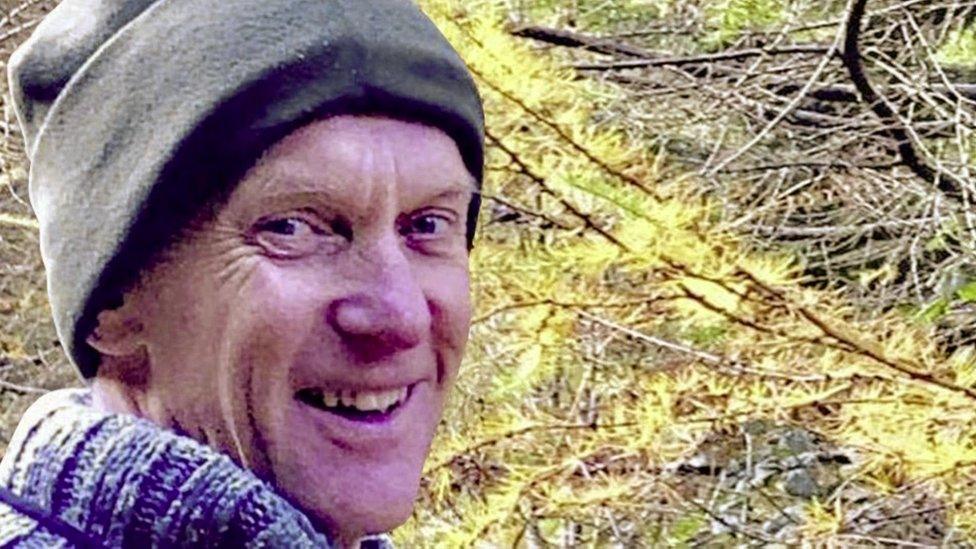Dr Michael Watt: Almost 20% of patients misdiagnosed
- Published

Dr Michael Watt worked at the Royal Victoria Hospital as a neurologist
Almost 20% of patients seen by neurology consultant Dr Michael Watt were given a wrong diagnosis, a report has found.
A review of 927 of Dr Watt's high-risk patients found 181 people received a diagnosis described as "not secure", Health Minister Robin Swann said.
He was speaking as the Belfast Trust announced the recall of a further 209 neurology patients seen and discharged by Dr Watt between 1996 and 2012.
This is the third such recall.
Dr Watt was at the centre of Northern Ireland's biggest patient recall linked to his work at Belfast's Royal Victoria Hospital.
'Unreservedly apologise'
Mr Swann said he had met patients and families affected by the recall in October last year.
"While this report is statistical in nature, it deals with individuals, their families and their experiences," he said.
"I know that many will have had their confidence in our health service shaken and I remain committed to helping restore it."
Mr Swann "unreservedly apologised" to those patients who have been affected.
"I also want to acknowledge that in announcing a further recall, more patients will be affected," he said.
"It is deeply regrettable that this experience should happen to any of our patients and it is even more so when I consider the total number of patients involved."
Extra clinics
In May 2018, the Belfast Trust recalled 2,500 patients for review after concerns were raised about the clinical work carried out by Dr Watt.
This was followed by a further 1,044 patients who were recalled in November 2018.
The RQIA regulatory body is also conducting a review into patient deaths.
An independent inquiry was elevated to a statutory public inquiry late last year but has yet to start hearing evidence.
Those affected by this latest recall were seen and discharged between 1996, when Dr Watt began his career, and 2012 and who are taking certain prescribed medications for specific neurological conditions.
The Belfast Trust said those affected would have received a letter asking them to set up a telephone review to ascertain whether the medication is appropriate for their condition.
Extra clinics have been set up to facilitate face-to-face interviews where necessary.
'Sincere regret'
Belfast Trust chief executive Dr Cathy Jack said she was "truly sorry" over the further recall.
"I absolutely understand that this will cause worry and anxiety to a number of people and their families and I am deeply sorry for that," she said.
"I also accept this next stage may be very difficult for those patients who have already been reviewed and whose diagnoses may have been changed as a result of our two previous recalls.
"Again, I want to express the trust's sincere regret for all the hurt and pain caused over the last number of years and for the harm that has undoubtedly been done.
"It is absolutely imperative that we put right any past wrongs and while this is painful, it is vital we assure ourselves that former patients, now discharged and who are taking very specific medication, are taking it for the correct reasons."
Ulster Independent Clinic and Hillsborough Private Clinic are recalling 57 and 10 former patients respectively.
Separately, the trust also reviewed case notes of 66 patients who had a blood patch procedure under the care of Dr Watt and who did not have a clinical review as part of the recall process.
It found that for 45 patients there was no clinical evidence to support that a blood patch was required.
And, for 46 patients the care was unsatisfactory and fell below the standard expected by the trust.
"We are deeply sorry for this and for the undue hurt these patients experienced," the trust added.
Redress payments
Colm Gildernew, who chairs the health scrutiny committee at Stormont. described it as a scandal that has caused immense distress.
"The neurology inquiry has revealed again more examples of a lack of transparency, deficits in governance arrangements and accountability within the health service," he said.
The Sinn Féin assembly member asked what lessons had been learned?
Meanwhile DUP assembly member Pam Cameron, deputy chair of the committee, asked about a timetable and scale of resource for financial redress for those entitled to compensation.
Mr Swann could not provide a definitive date but added: "Redress payments will be paid because this is a failure of our systems that has to be corrected."
Related topics
- Published8 October 2020

- Published21 September 2020

- Published19 December 2019
